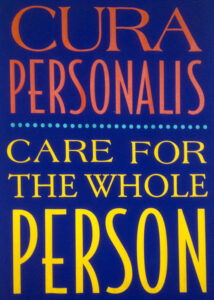 This is the second in a series of weekly blog posts this semester concerning the Office of Student Affairs.
This is the second in a series of weekly blog posts this semester concerning the Office of Student Affairs.
I don’t think it’s much of a stretch to say that here in the Law School’s Office of Student Affairs cura personalis guides and informs our work.
To the uninitiated, cura personalis is a credo of sorts at Jesuit schools. The Latin can be translated as “care for the whole person.” In other words, this thing we’re doing here is more than a transactional relationship wherein the institution provides an education and the student pays a fee in exchange for said education. The school—but really, to call upon the dean’s frequent message, what that means is the people who work at the school—cares about developing our students into value-guided professionals. It also means when things get hard, you don’t have to figure it all out on your own.
It can be easy to miss that message when everything is exciting, new, and going great. Every law school, surely, holds a new student orientation. Marquette University Law School is no exception. Throughout an online Pre-Orientation program and a two-day in-person program, students get to hear from faculty, staff, and upper-level students about all manner of things—from professional identity to how to read and brief a case to how to get around Eckstein Hall and our larger Marquette campus. We also talk about resources pertaining to mental health and where students might turn when “life happens.” We say this because it’s important, and we say it in a variety of ways and places.
I have to admit that I’m quite proud of our New Student Orientation programming. With the help of far too many people to list here (but come ask me if you’re curious!), we aim to hold a balanced and informative program that sets up our new law students nicely for the semester to come. And yet, let’s be real: How much does anyone really retain from orientation? We’re too busy trying to make friends, conquer our nerves, and just figure out where the bathrooms are. We take in what is immediately relevant to allow us to do these things and leave the rest for another day.
That other day, in an important sense, comes on the first Thursday of the spring semester, when our office hosts “Spring Orientation” for our 1Ls. Another orientation? What could we possibly have left to say, and after a full semester no less? It’s not so much what we have left to say as what we might try to say again, in a different way. The start of spring semester of 1L year is often when the sheen of law school wears off. Students have ridden the wave of anxiety/fear/relief/joy/exhaustion (in no particular order) that comes with finals’ period and receiving one’s grades. They are starting to think about summer jobs and also have lives outside of Eckstein Hall that continue to move forward, for better and for worse—engagements to funerals. It’s all happening.
So Spring Orientation is an opportunity to focus on the resources available to students—such resources including faculty and staff, peers and mentors, the Marquette University Counseling Center, and the Wisconsin Lawyers Assistance Program (WisLAP). Spring Orientation also allows us to focus on the opportunities available at this particular moment—to reflect, dig in, reach out, and try, try, try.
We hold Spring Orientation at the start of the spring semester because this is the time when our ears might be primed to hear it. When it’s relevant. When it might stick.
This year, for the presentation, we brought together a faculty member who discussed academic growth, representatives from the Counseling Center and WisLAP to discuss their services, and a recent alumna who spoke beautifully and unabashedly to her 1L experience and beyond. When I closed Spring Orientation, I let all of our 1Ls know that they will soon receive an invitation from me to meet one-on-one. No pressure and nothing formal or particularly novel; just an opportunity to catch up if we’ve already met or get to know each other if we haven’t.
I’ve extended this invitation to 1Ls for a number of years now, and I always feel a little vulnerable when I press “send” on the emails. Will anyone take me up on the offer? Once the appointment confirmations roll in, I breathe a sigh of relief. And once the meetings begin, I find myself utterly reinvigorated (just in time for spring).
Our students teach me a lot during these meetings. I learn, at a most basic level, where they’re from and what practice areas they want to explore. I learn (and am always reminded) that what works for some does not work for all. But I also get to learn about their interests—many of which converge with my own (looking at you, student, who reads romance novels and all the students who sheepishly admit to enjoying Civ Pro). I learn about their very real anxieties and concerns, their families, and their worlds. They learn where my office is and maybe an embarrassing story or two from my past.
Whether this little slice of what we get to do in student affairs counts as cura personalis or not, I can’t say for sure. You will have to ask our students that. I can say it’s a privilege to speak at a time when things need to be heard and to listen when our students want and need to speak.
